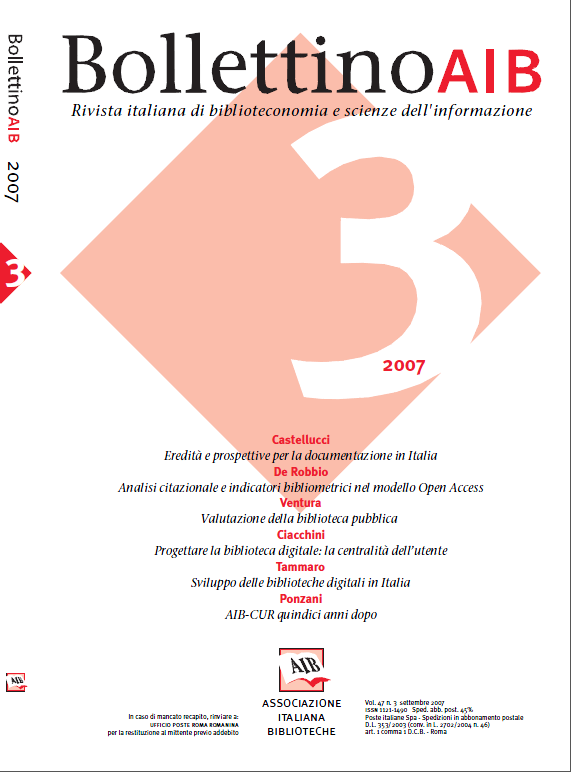The development of digital libraries in Italy: results of an investigation
Main Article Content
Abstract
The theme of the development of digital libraries is of particular relevance in Europe and by the year 2010 the European Digital Library programme foresees making a collection of at least six million books, documents and other cultural objects accessible on-line. The results of the discussions "i2010 European Digital Library", that took place in 2006, indicated some precise priorities for the development of digital libraries such as the convergence of cultural institutions (libraries, archives and museums) and the encouragement of new synergies between public and private institutes. To what extent can the development of digital libraries in Italy be said to be integrated in the European process? To answer this question, the study Group of the "Digital Libraries Applications" project, promoted by the Fondazione Rinascimento Digitale, carried out an investigation in 2006 on the state of the art of digital libraries in Italy. The approach chosen in the investigation was that of the user's viewpoint. It was asked: how has the offer of services and the management of cultural institutions been changed? How has user access to resources been changed as a result of the availability of digital libraries? The aim of the investigation was to understand the priorities of the user and his satisfaction for the services of digital libraries. The investigation sought to analyze the development towards digital of the various cultural institutions, in order to understand how these are renewing the organization and offer of services. It did not just describe the results of the great national projects such as that of the Italian digital library which are already amply documented in literature and in Conference documents.
The methodology of the investigation was based on the different tools for collecting data, in order to test a possible evaluation methodology for digital libraries:
The methodology of the investigation was based on the different tools for collecting data, in order to test a possible evaluation methodology for digital libraries:
- an investigation of the user, based on a questionnaire and structured interviews;
- a review of the applications of digital libraries in Italy, based on the documentation and personal experience of the experts who participated in the Project's Study Group;
- a questionnaire addressed to the staff of the various cultural institutions;
- interviews of experts in order to focus on the problems highlighted;
- a comparison of the functional character and accessibility of the Web sites of the digital libraries.
Article Details
Section
Articles

This work is licensed under a Creative Commons Attribution-ShareAlike 4.0 International License.
